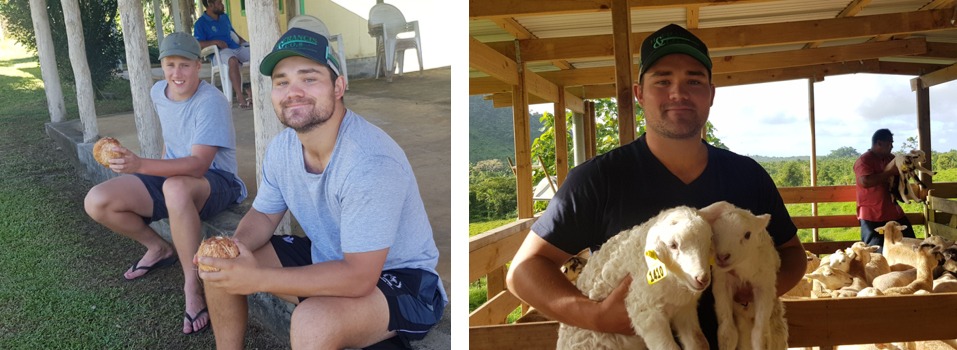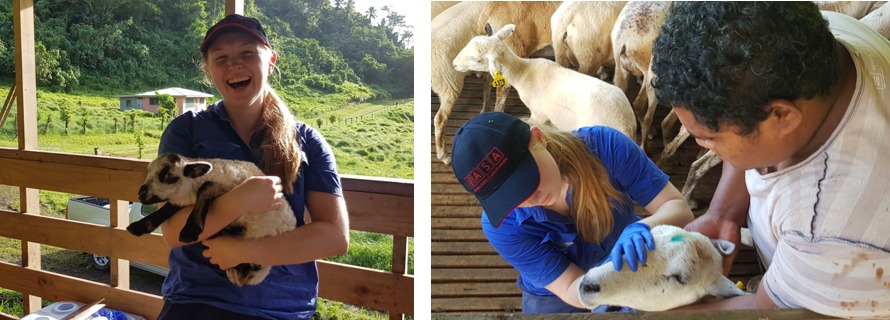

Improving Small Ruminant Production and Supply in Samoa
February 19, 2020
As part of our concerted efforts to support and encourage the next generation of Australians in study, careers and volunteering in international agricultural research, the Crawford Fund State Committees proudly support our Student Awards.
These awards allow university students from around Australia to include an international component to their studies, to travel to their host countries to research and explore their chosen topic areas and gain international agricultural research experience and expertise.
Throughout the past year, we have enjoyed sharing the journey of our 2018 recipients of these Awards and their experiences have been diverse and overwhelmingly positive. They are available here.
We now proudly present to you the reports from our 2019 cohort as they complete their travels and research. To date we have reported on the experiences of Luke Dieters from the University of Queensland; Jori Bremer from the University of New England; Nadeem Akmal from the University of Canberra; and most recently Nina Matsumoto from the University of Sydney and Peter Richardson from the University of Melbourne.
Also, we have launched our 2020 Student Awards which are available for university students from every State and Territory so check out the backgrounder and apply online.
Three students from Charles Sturt University travelled to Samoa to complete the practical component of their honours studies in mid-June, 2019, for six weeks as part of an ACIAR project, Improving Small Ruminant Production and Supply in Fiji and Samoa. Charles Callaghan and William Davies, were Bachelor of Agriculture Business Management students, and Rebecca Owen, was a Bachelor of Animal Science student. They were each successful in their applications for a Crawford Fund Student Award and this is a combined report on their award experience in the Pacific.
The students departed Wagga Wagga a little anxious about the experience ahead, accompanied by supervisors, Dr David Jenkins and Emma Hand.
“While all three of the students had travelled overseas before, some to developing countries, none had completed their own research projects, and certainly not in a developing country setting. This offered the students an incredible opportunity for personal growth and development,” reported Emma who was recently involved as a RAID member in a Crawford Fund NextGen panel at the National Association of Agricultural Educators.
“The students were thrust into a steep learning curve, having to learn quickly about their chosen topics, research principles and the Samoan culture and landscape,” she said.
Being Ag Business students, Charles and William focused on the farm management and feasibility of the Samoan sheep industry. For Charles’ dissertation, titled “An Investigation into the Economic Feasibility of Small Holder Sheep production in Samoa,” he interviewed almost all sheep farmers in Samoa, with the help of the local Ministry of Agriculture and Fisheries, Animal Production and Health Division (APHD) staff. Due to language barriers associated with interviewing non-English speaking local farmers, Charles was able to develop his communications and interpersonal skills greatly.

Charles found that sheep production in Samoa was not currently feasible, with the major constraints centred around inadequate nutrition and dog attacks, with some farmers losing up to 50% of their flock in one night. He recommends that more investigations are needed into improved pastures and the development of supplementary feeds which can be produced locally. Charles was awarded class 1 honours.
William investigated the challenges faced by the Samoan sheep meat value chain for his dissertation “How can existing challenges facing the Samoan sheep meat sector be identified using a value chain approach?”. William conducted an amazing 113 interviews in his six weeks in Samoa with sheep farmers, wholesalers, importers, retailers, restaurants and resorts, and consumers, overcoming many communication and cultural barriers to complete this task. He also showed great resilience and persisted, despite these challenges, to achieve his research aims. William was awarded class 2a honours.
Being an Animal Science student, Rebecca chose a study area more closely related to sheep production with her dissertation titled “Gastrointestinal Nematodes of Sheep in Samoa”. Rebecca joined Charles on his visits to Samoan sheep farmers and collected faecal samples from a huge 905 sheep; this is estimated to be around 70-80% of the total Samoan sheep population.
Rebecca also trained a number of APHD staff in faecal egg count and larval culturing techniques.
She also showed incredible resilience, overcoming a number of typical developing country challenges while completing her laboratory work, including power non-functional microscopes, power and water outages with the majority of her “laboratory” work being completed in hotel bathrooms.

Rebecca recommended that the APHD increase their extension provision to Samoan sheep farmers on the control and management of gastrointestinal parasites. Rebecca was awarded class 1 honours.
“Through this scholarship, not only have the three students undergone significant personal development, which will no doubt enhance their careers and their contribution to agriculture in the future, but a strong relationship with the existing relationship with the APHD has been strengthened. These investigations have and will significantly contribute to the ACIAR Fiji and Samoa small ruminant project, which is in initiation,” concluded Emma.




 0
0